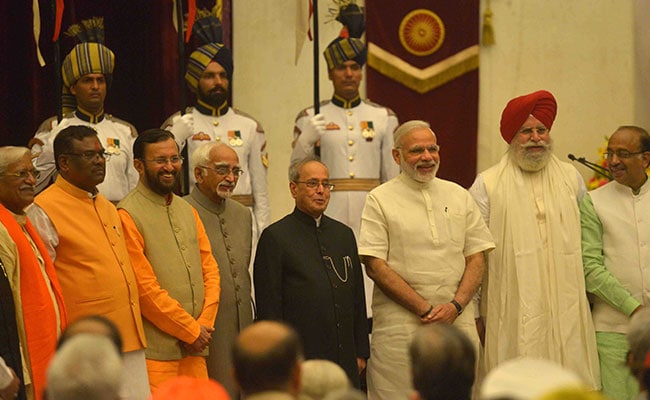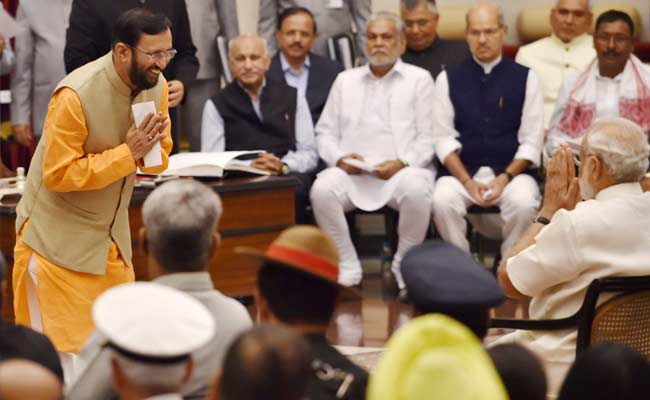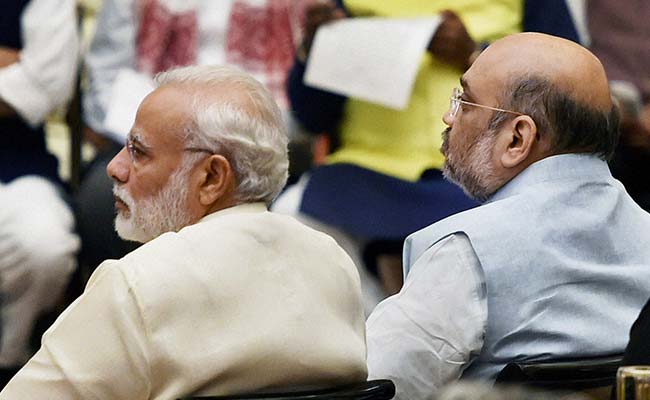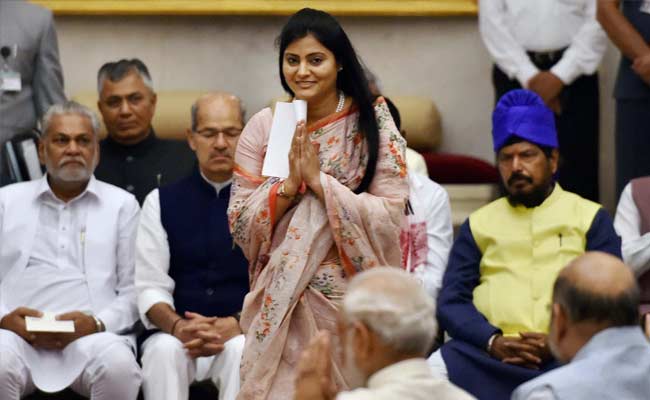So what could have been the motivation for the reshuffle? It's a bit difficult to argue it was all about "performance", though that's what government-friendly spin doctors would like us to say. If so, there would have been no reason to sack Jayant Sinha as Minister of State for Finance, or to keep V K Singh in one of his posts: Minister of State for External Affairs. If "call drop minister" Ravi Shankar Prasad has been fired from the Telecom Ministry for poor performance, then why has he been given Law and Justice - arguably an even more important ministry?
No, the balance of probability is that there are many other reasons underlying the changes.

President Pranab Mukherjee, Vice President Hamid Ansari and Prime Minister Narendra Modi with new ministers.
Second: Modi's need for complete control. Many of the ministers who have been rewarded are those who take the Prime Minister's Office's suggestions as orders; many of those who have been punished are those who made their ministry's case vociferously to the PMO. Unreliable allies like the Shiv Sena continued to be excluded; entertainingly, an editorial in the Sena's paper, Saamna, said that "Modi is the lone face of this government. Compared to this, the ministries of Indira Gandhi and Jawaharlal Nehru had some excellent members..." That must sting.
Third: rewarding smart political management. Those who managed opposition to their machinations with minimum fuss have been rewarded. The big example here, of course, is former Human Resources Development Minister Smriti Irani. Much though the Delhi cocktail-and-Twitter circuit would like to imagine that Irani has been fired for being bad at her job, the truth is that she was very good at it. She implemented the RSS' agenda exactly, ensuring that Sangh members or sympathisers got important positions in institution after institution and university after university. She ensured that the Akhil Bharatiya Vidyarthi Parishad, the BJP's youth wing, got whatever they wanted whenever they wanted it - as the Rohith Vemula case made clear. The problem was, perhaps, that she confronted opposition head-on, drawing attention to herself.

Prakash Javadekar replaced Smriti Irani as Education Minister in the cabinet rejig on Tuesday
Once you look at the ministerial reshuffle this way, it becomes clear that it fits with Narendra Modi's overall style. He doesn't approve of his ministers hitting the headlines, only he is allowed to do that; he puts the party's needs in state politics first; and he always needs everyone in his team to remember he's the boss.
There are also a few other useful indicators in the reshuffle. In particular, some persistent myths have been quite effectively shown up.

Prime Minister Narendra Modi with BJP President Amit Shah at the swearing-in ceremony at Rashtrapati Bhavan in New Delhi on Tuesday (PTI photo)
Second, can we please stop hearing that "minimum government" line? In 2014, when Modi was first sworn in - with a 45-member council of ministers, he was widely praised for "keeping his promise" of minimum government. Naturally, he led the praises himself, tweeting: "Keeping our commitment to 'Minimum Government, Maximum Governance', we have made an unprecedented and positive change in Ministry formation".
Well, right now, Modi Sarkar is at 77 or 78 ministers - people are losing count - which is about the same as the UPA-II he derided, and just a few short of the legally-mandated maximum. It could be argued there's no link between the number of ministers and the overall size of governance - but what matters, surely, is that Modi and his backers claimed there is. Either way, Modi's government looks quite as maximum-sized as anyone's before him.

Anupriya Patel, a first-time MP from Uttar Pradesh, is among the 19 new ministers in Prime Minister Narendra Modi's government.
Indeed, just the opposite: Eastern UP's Anupriya Patel, who just a few weeks ago tweeted that "traitors" caused 100 million (UP Hindus) to be "scared" of 20 million "mullahs" - there are 20 million Muslims in UP - has been rewarded with a ministerial position.
You see, that's the kind of performance Narendra Modi really approves of.
(Mihir Swarup Sharma is a fellow at the Observer Research Foundation.)
Disclaimer: The opinions expressed within this article are the personal opinions of the author. The facts and opinions appearing in the article do not reflect the views of NDTV and NDTV does not assume any responsibility or liability for the same.


